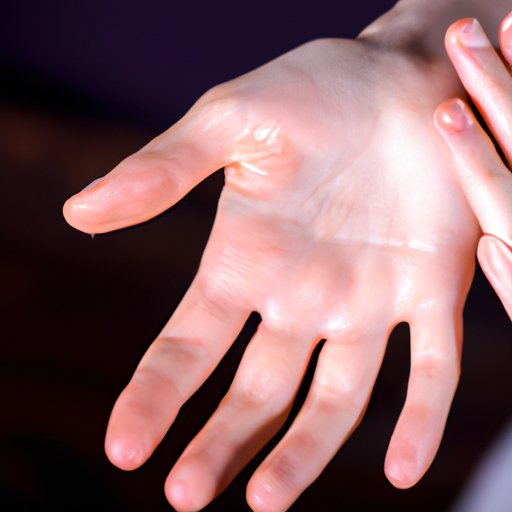
Introduction
Sweaty hands can be a frustrating and embarrassing problem for many people. It can make everyday tasks difficult and impact self-confidence. While it may seem like there is no cure for excessive sweating, there are several treatment options available that can permanently reduce sweat production. In this article, we will explore a variety of methods for treating sweaty hands.
Antiperspirant Lotions
Antiperspirant lotions are a popular first-line treatment for sweaty hands. These lotions work by blocking the sweat glands, reducing sweat production. When using antiperspirant lotions, it is important to apply them correctly for maximum effectiveness. First, wash and dry your hands thoroughly. Then, apply the lotion to your palms and fingers, making sure to rub it in evenly. It is best to apply the lotion at night before bed, as you will sweat less while sleeping. Additionally, avoid using lotions that contain fragrances or irritants, as they can exacerbate sweating.
Iontophoresis
Iontophoresis is a technique that uses electrical currents to reduce sweat production. This treatment is typically done in a doctor’s office or at home with a specialized device. To perform iontophoresis at home, begin by filling a shallow container with water. Place your hands in the water and connect them to the iontophoresis device. The device will release a gentle electrical current through the water and onto your hands, effectively reducing sweat production. The treatment typically takes around 20 minutes and should be repeated several times per week for maximum effectiveness.
Medications
There are several medications that can be prescribed to treat excessive sweating, including anticholinergics and beta-blockers. These medications work by blocking or reducing certain signals in the body that stimulate sweat production. It is important to work with a doctor to determine if medication is right for you, as some medications may have potential side effects. Common side effects include dry mouth, blurred vision, and heart palpitations. However, with the right medication and dosage, many people have found relief from excessive sweating.
Botox
Botox is a treatment typically associated with cosmetic procedures, but it can also be used to treat excessive sweating. When injected into the skin, Botox blocks the signals that activate the sweat glands, effectively reducing sweating. The treatment typically takes only a few minutes and lasts around 6-12 months. While Botox is generally safe, potential side effects include pain at the injection site, muscle weakness, and allergic reactions.
Surgery
In severe cases, surgery may be warranted to permanently reduce sweat production. One option is sympathectomy, which involves cutting or clamping the nerves that stimulate sweat production. This procedure is typically done under general anesthesia and requires a hospital stay. There are potential risks associated with surgery, including infection and nerve damage, so it is important to discuss the risks and benefits with a doctor before deciding if surgery is right for you.
Natural Remedies
For those who prefer a more natural approach to treating sweaty hands, there are several remedies that may be effective. One option is sage tea, which can be consumed or used as a hand soak. Sage is an astringent, which can help to reduce sweat production. Additionally, apple cider vinegar can be applied to the hands as a natural antiperspirant. Finally, stress reduction techniques such as meditation or yoga can help to alleviate anxiety, which can contribute to excessive sweating.
Conclusion
Sweaty hands can be a frustrating and embarrassing problem, but there are several treatment options available. Whether you prefer antiperspirant lotions, iontophoresis, medications, Botox, surgery, or natural remedies, there is a solution that can work for you. It is important to work with a doctor to determine the best course of treatment, as some options may have potential side effects. However, with persistence and the right treatment, it is possible to permanently reduce sweat production and regain confidence in everyday activities.





